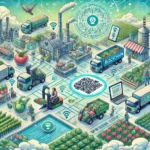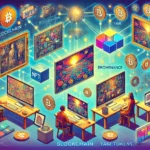Blockchain and artificial intelligence (AI) are two of the most transformative technologies of the 21st century, and their convergence is unlocking new possibilities across industries. While blockchain provides a secure, transparent, and decentralized way to store and share data, AI excels in analyzing, automating, and deriving insights from vast datasets. Together, these technologies create a powerful synergy that enhances data security, streamlines automation, and drives innovation.
This article explores how blockchain and AI are working together, their combined benefits, and the potential applications that are reshaping industries.
1. Understanding the Synergy Between Blockchain and AI
While blockchain and AI serve distinct purposes, their integration offers complementary advantages:
- Blockchain’s Strengths: Transparency, immutability, and decentralized data storage.
- AI’s Strengths: Data analysis, pattern recognition, and decision-making automation.
The combination allows AI systems to operate on reliable and tamper-proof data from blockchain networks, while blockchain benefits from AI’s ability to analyze and manage large volumes of information efficiently.
2. Enhanced Data Security and Integrity
Data security is a critical concern in today’s digital landscape. Blockchain and AI together create a robust solution for protecting sensitive information.
Immutable and Transparent Data
Blockchain ensures that data is stored in an immutable and transparent ledger, reducing the risk of tampering or unauthorized access.
AI-Powered Fraud Detection
AI can analyze blockchain transactions in real time, identifying anomalies and flagging potential fraudulent activities before they escalate.
Decentralized AI Models
AI models can be decentralized using blockchain, ensuring their integrity and protecting them from being altered or manipulated.
3. Automation Through Smart Contracts and AI
Smart contracts, self-executing agreements on blockchain networks, can be supercharged with AI to enable more sophisticated automation.
Smart Decision-Making
AI can analyze data inputs to make complex decisions within smart contracts, enabling automated workflows that adapt to changing conditions.
- Example: In supply chain management, AI-enhanced smart contracts can automatically adjust shipping routes based on real-time weather data or delays.
Predictive Automation
AI can predict trends and outcomes, feeding data into smart contracts to trigger preemptive actions.
- Example: Insurance platforms can use AI to analyze risk factors and blockchain to automate claim settlements transparently.
4. Revolutionizing Data Sharing and Ownership
One of the most exciting applications of blockchain and AI is in data sharing and ownership, particularly in healthcare, finance, and IoT.
Decentralized Data Markets
Blockchain enables secure data sharing between multiple parties, while AI adds value by analyzing shared datasets.
- Example: Researchers can access anonymized healthcare data on a blockchain network and use AI to identify treatment trends without compromising patient privacy.
Self-Sovereign Identity
Blockchain allows individuals to control their personal data, while AI can enhance privacy by enabling selective data sharing.
5. Real-World Applications of Blockchain and AI
1. Healthcare
- Blockchain: Ensures the secure storage and sharing of medical records.
- AI: Analyzes patient data to provide personalized treatment recommendations.
2. Finance
- Blockchain: Provides a transparent and tamper-proof record of financial transactions.
- AI: Detects fraud, automates trading strategies, and analyzes credit risks.
3. Supply Chain
- Blockchain: Tracks goods from production to delivery, ensuring transparency.
- AI: Optimizes routes, predicts demand, and monitors supply chain efficiency.
4. IoT (Internet of Things)
- Blockchain: Protects IoT devices by securing communication and data storage.
- AI: Processes data from IoT devices to automate responses and improve performance.
6. Challenges of Integrating Blockchain and AI
While the synergy between blockchain and AI holds immense potential, it also presents challenges:
1. Scalability
- Blockchain networks often face scalability issues, which can limit the speed and volume of data processing required by AI systems.
2. Data Quality
- AI relies on high-quality data to function effectively. Ensuring accurate data entry into blockchain networks is crucial.
3. Energy Consumption
- Both blockchain and AI can be resource-intensive, raising concerns about sustainability. Emerging technologies, such as energy-efficient blockchains and optimized AI algorithms, are addressing this issue.
4. Regulatory and Ethical Concerns
- Combining blockchain’s decentralized nature with AI’s data processing capabilities raises questions about privacy, accountability, and compliance with global regulations.
7. The Future of Blockchain and AI
As both blockchain and AI continue to evolve, their intersection is likely to drive groundbreaking innovations:
- Advanced Decentralized Applications (dApps): AI-powered dApps will enable more sophisticated functionalities in areas like DeFi, healthcare, and logistics.
- Enhanced Privacy Protocols: AI and blockchain will combine to create privacy-preserving data-sharing systems.
- Sustainability Solutions: Together, blockchain and AI can optimize energy usage in industries like agriculture and renewable energy.
Conclusion
The intersection of blockchain and AI represents a paradigm shift in technology, offering unprecedented opportunities for data security, transparency, and automation. By combining blockchain’s decentralized infrastructure with AI’s analytical and decision-making power, these technologies are transforming industries and enabling innovative solutions to complex challenges.
While hurdles like scalability and regulation remain, the potential of blockchain and AI to revolutionize data-driven processes is undeniable. As adoption grows, their integration will shape the future of technology, driving efficiency, trust, and innovation across the globe.


